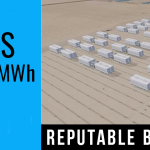 In response to Massachusetts Legislature passing a bill raising the state’s renewable energy standard and another encouraging clean energy and energy storage use during peak hours, solar and energy storage trade groups SEIA and ESA offered contrasting views.
In response to Massachusetts Legislature passing a bill raising the state’s renewable energy standard and another encouraging clean energy and energy storage use during peak hours, solar and energy storage trade groups SEIA and ESA offered contrasting views.
Bill H4857, ‘An act to advance clean energy’, determines a new ‘Clean Peak Standard’ through which the impacts of peak demand and especially the use of fossil fuels to meet that demand would be encouraged, as well as a revision to the state’s Renewable Portfolio Standard (RPS) which would see the RPS raised by 2% each year through to 2029. Under that set of conditions, the RPS could be close to 50% by 2030, from 13% today.
The legislation determines energy storage systems to be among qualifying RPS ‘clean peak resources’ to reduce peak demand along with demand side response. Such resources were defined as those that: “generate, dispatch or discharge electricity to the electric distribution system during seasonal peak periods, or alternatively, reduces load on said system” in the bill. Energy storage systems must be primarily operated to store and discharge renewable energy.
Retail electricity suppliers will have to provide a minimum percentage of clean peak electricity to customers, electric distribution companies will have to start producing maps of congested and constrained areas and demonstrate how they are building resilience and flexibility into their networks. Distribution companies have also been permitted to explore ‘non-wires alternatives’ (NWAs) to infrastructure upgrades, for which energy storage is increasingly being looked at as one of those viable NWAs. Competitive solicitations must be held in these instances. By mid-February 2019, distribution companies will also have to report to the department of energy resources detailing the energy storage systems installed in their service territories.
Perhaps most strikingly, the bill includes a 1,000MW energy storage target for the state. The state’s department of energy resources has been instructed to consider a variety of methods to foster this, which could include changing the methods by which energy storage systems are procured that would value their benefits more accurately than incumbent methods. The target should be reached by 31 December 2025.
SEIA’s measured reaction
According to the national trade group Solar Energy Industries’ Association (SEIA), Massachusetts currently meets around 8.6% of its electricity needs with solar. It is also the second biggest employer of workers in the solar PV industry among US states.





